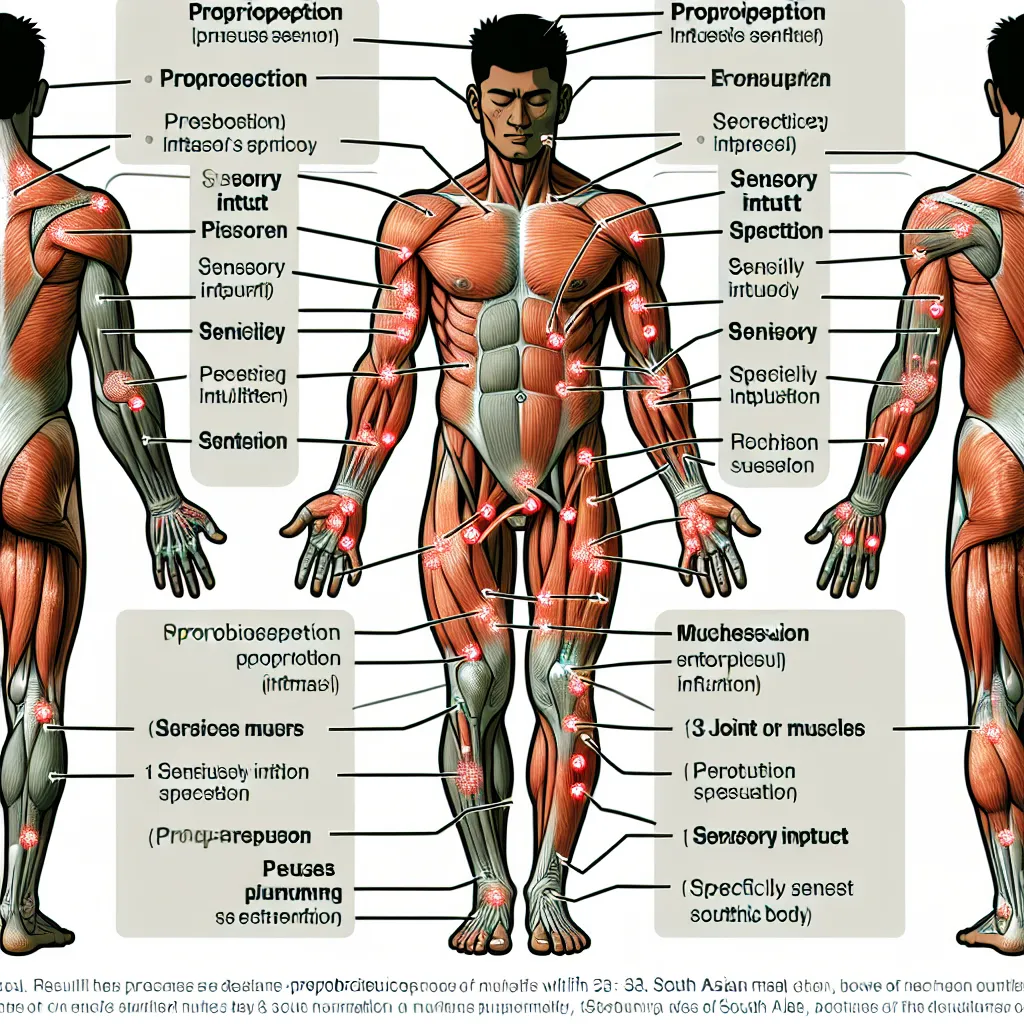Proprioception is a vital concept in the field of sports physiotherapy and human movement. Let’s break down this term to understand its significance in the IELTS context.
Definition: Proprioception refers to the body’s ability to sense its position, movement, and actions without relying on visual input. It’s often described as the “sixth sense” that allows us to know where our body parts are in space.
Part of Speech: Noun
Pronunciation: /ˌprōprēəˈsepSH(ə)n/
As a specialized term in sports medicine, proprioception is particularly relevant for IELTS candidates focusing on health sciences or athletic performance.

Context and Usage
Understanding how to use ‘proprioception’ in various contexts is crucial for IELTS success. Let’s explore some examples:
-
“The athlete’s exceptional proprioception allowed her to maintain balance on the narrow beam.”
Analysis: This sentence demonstrates how proprioception relates to athletic performance, particularly in sports requiring fine balance control. -
“Rehabilitation exercises focusing on proprioception are essential for patients recovering from knee injuries.”
Analysis: Here, the term is used in a medical context, highlighting its importance in physical therapy and injury recovery. -
“Studies show that regular yoga practice can enhance proprioception, leading to improved body awareness.”
Analysis: This example links proprioception to alternative fitness practices, broadening its application beyond traditional sports. -
“The loss of proprioception in elderly individuals often contributes to an increased risk of falls.”
Analysis: This sentence applies the concept to geriatric care, demonstrating its relevance across different age groups. -
“Advanced robotics now incorporate artificial proprioception to mimic human-like movement capabilities.”
Analysis: This example extends the concept to technology, showing its interdisciplinary nature.
Common Contexts
In IELTS, ‘proprioception’ might appear in:
- Reading passages about sports medicine or physical therapy
- Listening segments discussing athletic training or injury prevention
- Writing Task 2 essays on topics related to health and fitness
- Speaking Part 3 discussions about advancements in sports science
Frequency in IELTS
While not extremely common, ‘proprioception’ can appear in IELTS, especially in academic modules or in tests tailored for healthcare professionals. It’s more likely to be encountered in Reading and Listening sections, but could be valuable vocabulary for Writing and Speaking tasks related to sports or health.
Vocabulary Analysis
Word Structure
- Prefix: ‘proprio-‘ (relating to one’s self)
- Root: ‘-cept-‘ (to take or receive)
- Suffix: ‘-ion’ (indicating a state or condition)
Understanding this structure can help you recognize and remember related words like ‘perception’ or ‘reception’.
Synonyms and Antonyms
Synonyms:
- Kinesthesia /ˌkɪnəsˈθiːziə/
(noun) – awareness of the position and movement of body parts - Body awareness /ˈbɒdi əˈweənəs/
(noun phrase) – consciousness of one’s physical self - Position sense /pəˈzɪʃən sens/
(noun phrase) – ability to determine the relative position of body parts
Antonyms:
- Proprioceptive deficit /ˌprōprēəˈseptɪv ˈdefɪsɪt/
(noun phrase) – lack of positional awareness - Sensory impairment /ˈsensəri ɪmˈpeəmənt/
(noun phrase) – reduced ability to perceive sensory input
Memory Techniques
Mind Mapping
Create a mind map with ‘proprioception’ at the center, branching out to related concepts:
- Balance
- Coordination
- Joint stability
- Muscle memory
- Spatial awareness
Storytelling
Imagine a gymnast performing a complex routine on a balance beam. Her proprioception allows her to know exactly where her body is in space, even with her eyes closed. This extraordinary sense helps her maintain perfect balance and execute precise movements, showcasing the power of proprioception in athletic performance.
Practical Application
Exercise 1: Sentence Completion
Complete the following sentences using ‘proprioception’ or related terms:
- The __ exercises helped the athlete recover his sense of balance after the injury.
- Dancers often have highly developed __, allowing them to perform complex movements with precision.
- The new wearable technology aims to enhance athletes’ __ through real-time feedback.
Exercise 2: IELTS Writing Task 2
Practice using ‘proprioception’ in an IELTS Writing Task 2 essay. Here’s a sample topic:
“Some people believe that advancements in sports science give athletes an unfair advantage. To what extent do you agree or disagree?”
In your response, consider discussing how proprioception training could be seen as a natural enhancement of an athlete’s abilities, rather than an unfair advantage.
Conclusion
Mastering the concept of proprioception is valuable for IELTS candidates, especially those interested in sports science, physiotherapy, or general health topics. By understanding its definition, usage, and related vocabulary, you’ll be better equipped to tackle questions across all sections of the IELTS exam.
Remember to practice using this term in various contexts, and don’t hesitate to incorporate it into your Writing and Speaking responses when relevant. Continuous exposure and application will help cement your understanding and improve your overall performance in the IELTS test.
We encourage you to share your experiences with learning and using this term in the comments below. How has understanding ‘proprioception’ enhanced your IELTS preparation? Do you have any questions about its usage in specific IELTS contexts? Let’s discuss and learn together!